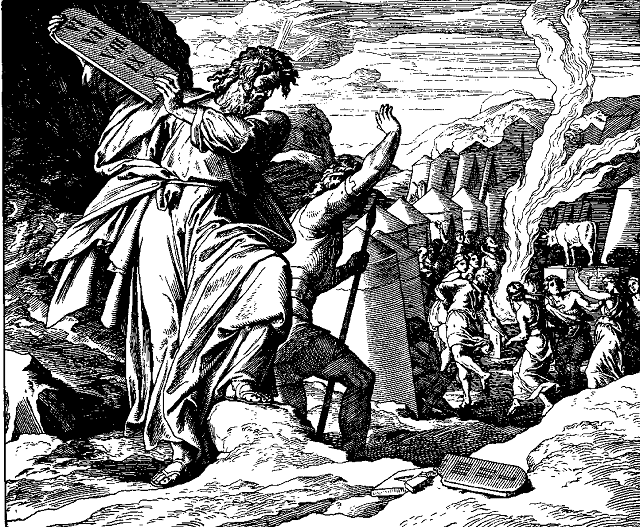
Idolatry is a conscious act by nature or definition. Catholics are accused of substituting bread and wine as idols for the living God. I think virtually no Catholic who knows anything at all about his Faith would be stupid enough consciously to worship what he believes is still just a piece of bread.
It may be regarded as mistaken worship, but it is still quite pious and non-idolatrous, just as we Catholics would say that Lutheran or Anglican worship is pious and well-intentioned but in fact lacks the Real Presence (due to ordination and apostolic succession issues). It’s not idolatrous — only mistaken as to the metaphysics.
Where is the sin in worshiping Jesus Christ our Lord and Savior and Redeemer — God the Son? We think He is truly present in the consecrated elements. So did Luther. If we are idolaters, so is he. Luther was even known to bow in adoration. Lutherans, too, believe that Jesus Christ is truly, substantially present after the Consecration, so why are they not habitually accused of idolatry?
It is of the essence of idolatry to be from one’s heart and soul and will. If one is replacing God with something else, that is an interior decision. It has to be; otherwise, the whole thing would be reduced to robotic actions of an agent with no free will. This sort of thing is presupposed also in the Sermon on the Mount, where Jesus shows how all sins begin in our hearts: hatred is the seed of murder, lust the kernel of adultery, et cetera. All sin is like that (at least the sin for which we are responsible).
Idolatry is the worshiping of a false god. That does not happen at Mass, because it is understood by all that Jesus, not bread and wine, is being worshiped eucharistically. The very word transubstantiation proves this. As for its being a matter of the heart and soul: the Bible establishes that, I think:
Isaiah 66:3 like him who blesses an idol. These have chosen their own ways, and their soul delights in their abominations.
Ezekiel 14:4-5 Therefore speak to them, and say to them, Thus says the Lord GOD: Any man of the house of Israel who takes his idols into his heart and sets the stumbling block of his iniquity before his face, and yet comes to the prophet, I the LORD will answer him myself because of the multitude of his idols, that I may lay hold of the hearts of the house of Israel, who are all estranged from me through their idols.
Ezekiel 20:16 because they rejected my ordinances and did not walk in my statutes, and profaned my sabbaths; for their heart went after their idols. (cf. Ezek. 36:25; Sir. 46:11)
Another biblical motif is God’s disgust over men “serving” idols (which is from the heart and the will: 2 Kings 17:12; 2 Kings 21:21; 2 Chron. 24:18; Ps. 106:36; Ezek. 20:39; 1 Thess. 1:9). St. Paul locates idolatry firmly in the interior disposition:
Romans 1:21, 24-25 [F]or although they knew God they did not honor him as God or give thanks to him, but they became futile in their thinking and their senseless minds were darkened. . . . Therefore God gave them up in the lusts of their hearts to impurity, to the dishonoring of their bodies among themselves, because they exchanged the truth about God for a lie and worshiped and served the creature rather than the Creator, who is blessed for ever! Amen.
The word for “minds” in Romans 1:21 is kardia (“heart”: the basis of “cardiac”), and is often rendered “heart” or “hearts” in other translations. The same word appears in Romans 1:24, where it is rendered “hearts” in the RSV. In the KJV it is translated “heart” all 158 times that it appears (according to Young’s Concordance).
The Catholic Encyclopedia’s entry for “Idolatry” backs me up also:
The guilt of idolatry, however, is not to be estimated by its abstract nature alone; the concrete form it assumes in the conscience of the sinner is the all-important element. [see, J. Wilhelm, “Idolatry,” Catholic Encyclopedia, (New York: Robert Appleton, 1913) ]
Idolatry is an internal disposition — the conscious worshiping of something other than God and replacing God with a creature or inanimate object.
***
Related Reading:
***
(originally 2015)
Photo credit: Moses breaks the Ten Commandments in response to the golden calf worship (1860), woodcut by Julius Schnorr von Carolsfeld (1794-1872) [public domain / Wikimedia Commons]
***













